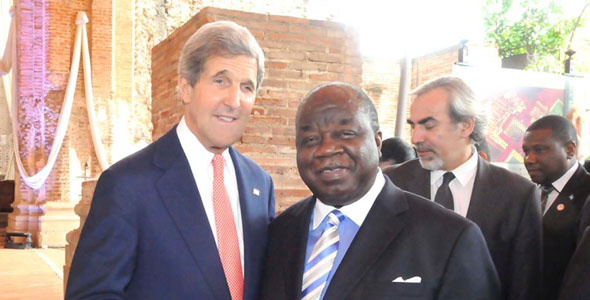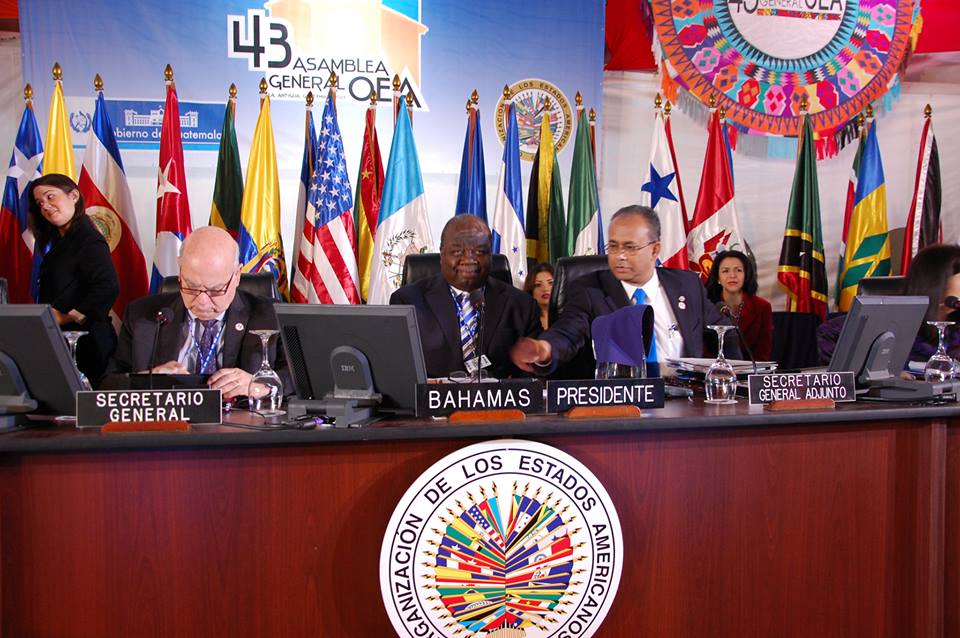
WASHINGTON, D.C. (June 10) — Describing the global drug problem as “a long-standing, persistent, and destructive one, impacting countries throughout the hemisphere,” His Excellency Ambassador Dr. Elliston Rahming, The Bahamas’ Washington, D.C.-based permanent representative to the Organization of American States (OAS), said on Wednesday, June 5, that the geography of The Bahamas “presents a particularly difficult challenge” in addressing the drug problem.
“Located just off the coast of the United States, our geographical configuration of hundreds of islands spread over more than 100,000 nautical miles of water, makes The Bahamas especially vulnerable to illicit transit and trafficking of drugs,” Dr. Rahming said, in an address at the 43rd General Assembly of the OAS in Antigua, Guatemala.
More than 1,000 officials from 36 international delegations and 28 Foreign Ministers attended the high-powered meeting, held from June 4 – 6.
Dr. Rahming headed the Bahamian delegation that also included Ms. Kimberley Lam, Second Secretary/Vice Consul at the Permanent Mission, and Mr. Mikhail Bullard of the Ministry of Foreign Affairs.
Noting that The Bahamas is situated between the producer nations of South and Central America and the consumer nations of North America and Europe , in his address Dr. Rahming explained that only a “handful” of the islands of The Bahamas are populated and this fact provides “a natural bridge for traffickers, who use the less developed islands and cays to store their contraband before transshipping it to the United States, principally, and other destinations.”
“The challenges associated with securing our borders as a consequence of geography are further exacerbated by resource constraints,” the Ambassador said, adding that despite “these challenges, the Government of The Bahamas has been on the frontline for more than four decades, taking a strong position to defend our country against illicit trafficking and to contribute to regional, hemispheric and global drug control initiatives.”
“We continue to allocate upwards of 14% of our annual budget to law enforcement agencies so that they may be better equipped to tackle evolving trafficking routes, modes of shipment, and centres of production,” Dr. Rahming explained.
The Bahamas ‘ permanent representative to the OAS declared that The Bahamas has also “made significant progress in the training of our judiciary and the modernization of our laws through amendments and/or new enactments to strengthen our anti-drugs and crime efforts.”
“Concurrent with our punitive measures to address illegal drugs, we will continue to adopt strategies and programmes to address drug prevention and treatment, taking into account the emergence of relatively new synthetic drugs within the Caribbean sub-region,” the Bahamian envoy promised.
In seeking to develop new and innovative initiatives and strategies to address the problem of drugs, Dr. Rahming said that “we must continue to strengthen and develop partnerships at the national, regional and international level.”
“These policies should be dynamic and adaptable, tackling reduction of supply and demand, through strengthening law enforcement, national legal systems as well as through the promotion of prevention initiatives,” he advised. “Such initiatives require engagement of, and dialogue with, the public and private sector regarding drugs and crime and the provision of a platform where youth, particularly within the inner cities, can voice their opinions and offer solutions to problems related to drugs and crime.”
The Ambassador noted that these “complementary strategies, among others, were outlined in The Bahamas’ National Anti-Drug Plan for the period 2012-2016 which was a collaborative effort by a wide range of stakeholders and took into account the evolution of the drug problem as it impacts The Bahamas and the region.”
“As we move forward in the development of national and international policies to fight drugs, we continue to learn,” Dr. Rahming said. “This is why exchange of best practises through such forums is of paramount importance as it allows us to adapt the experience of our sister nations to our own national initiatives where applicable.”
He added, “We believe that our national efforts, complemented by our bilateral and multilateral security partnerships, have proven their effectiveness. Speaking of our multilateral partnerships, we believe that through our membership in this Organization we have made important progress toward tackling the challenges we face in the fight against drugs.”
The Ambassador also noted that The Bahamas’ “participation in the Inter-American Drug Abuse Control Commission (CICAD) has been instrumental in the successes we have seen and in this regard” and he reaffirmed The Bahamas’ “support, at the political level, for the work of the Inter-American Drug Abuse Control Commission (CICAD), which for the past 27 years has been at the forefront of hemispheric initiatives in drug control.”
“Through CICAD our national authorities have had the opportunity not only to dialogue with counterparts but to contribute to, and participate in capacity building initiatives,” Dr. Rahming said. “Last year, The Bahamas saw its candidate, as one of the first two fellows honored in its CICAD Policy Fellowship (CPF) Program. A clinical psychologist working in the Sandilands Rehabilitation Centre, she formed part of CICAD’s Demand Reduction Section and focused on the dual diagnosis of drug dependent clients.”
Pointing out that although the theme of this General Assembly was the fight against drugs, Dr. Rahming said that “it would be remiss not to mention the illicit trafficking of firearms, which for The Bahamas goes hand in hand with the fight to combat the illicit trafficking of drugs.”
“The transnational nature of threats to security such as illicit drug trafficking and related crimes negatively impact peace and security in our countries and while we have made great strides towards achieving the goals we laid in the Hemispheric Plan of Action, there is more work to be done.,” Dr. Rahming said.
He also highlighted the fact that a discussion on the Hemispheric Plan of Action “cannot take place without a discussion on threat to development throughout the Hemisphere posed by these crimes.”
“Although our countries in the Americas are at different stages of development, strengthening integral and sustainable development is of paramount concern as it is essential for the security of the hemisphere,” the Ambassador suggested.
Declaring that it is unfortunate that “our hemisphere is currently faced with growing threats posed by the global drug problem,” Dr. Rahming added, “However, theses are challenges we will face together. The Bahamas believes that the continued support and dedication of Member States and our respective partners in sharing and providing human and financial resources in the fulfillment of our mutual obligations in these areas are vital to our efforts to promote and ensure security in our countries and in the hemisphere. To this end, The Bahamas pledges to continue to work with the Member States in support of the OAS to strengthen its institutions and establish the necessary mechanisms to fight the scourge of drugs in our hemisphere.”









